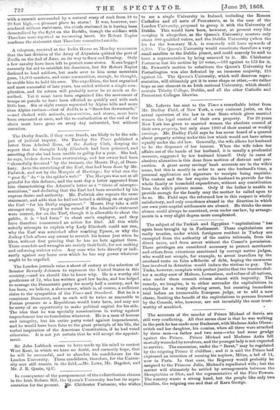The Derby frauds, if they were frauds, are likely to
be the sub- ject of judicial inquiry. On Tuesday the Times published a letter from Admiral nous, of the Jockey Club, denying the report that he thought Lady Elizabeth had been poisoned, and asserting that she had been unable to gallop for a year. She had, he says, broken down from overtraining, and her owner had been 4‘ shamefully deceived" by the trainers, the Messrs. Day, of Dane- bury. As to the scratching of the Earl, that had been done by Mr. Padwick, and not by the Marquis of Hastings ; for what can the "poor fly" do "in the spider's web?" The Marquis was not at all grateful for this defence, and the next day a letter appeared from him characterizing the Admiral's letter as a "tissue of misrepre- sentations," and declaring that the Earl had been scratched by his express desire and authority. Mr. Padwick also repeats the same statement, and adds that he had not betted a shilling on or against the Earl for his Derby engagement." Messrs. Day take a still stronger step. They would be ruined if the Admiral's statement were correct, for on the Turf, though it is allowable to cheat the public, it is "bad form" to cheat one's employer, and they have therefore commenced an action for libel. All this while embody attempts to explain why Lady Elizabeth could not run, why the Earl was scratched after reaching Epsom, or why the Jockey Club allows any owner to scratch his horses just when he likes, without first proving that he has no bets against them. These scandals and wrangles are mainly their fault, for not making and enforcing stricter rules. Any man who bets directly or indi- rectly against any horse over which he has any power whatever ought to be expelled.


































 Previous page
Previous page